1 Samuel 1 meaning explained in AI Summary
This chapter introduces us to Hannah, a childless woman, and her husband Elkanah. It sets the stage for the birth of Samuel, a pivotal prophet in Israel's history.
Hannah's Sorrow and Prayer:
- Elkanah has two wives, Hannah and Peninnah. Peninnah has children, but Hannah remains barren.
- Every year, Elkanah makes a pilgrimage to Shiloh to worship the Lord. He faithfully gives Hannah a double portion of the sacrifice, but Peninnah taunts her for her infertility.
- Deeply distressed, Hannah weeps and prays fervently to the Lord for a son. She vows to dedicate him to the Lord's service all his life.
- Eli, the priest, sees Hannah praying silently and mistakenly thinks she is drunk. He rebukes her.
- Hannah explains her situation and her heartfelt prayer. Eli blesses her, saying, "Go in peace, and may the God of Israel grant you what you have asked of him."
God's Answer and Hannah's Faithfulness:
- Hannah leaves with renewed hope. She conceives and gives birth to a son, whom she names Samuel, meaning "God has heard."
- When Samuel is weaned, Hannah fulfills her vow. She takes him to Shiloh and presents him to Eli, dedicating him to the Lord's service.
- Hannah expresses her gratitude and joy in a beautiful prayer of praise, acknowledging God's power and sovereignty.
Key Themes:
- The pain of infertility and the longing for a child. Hannah's story resonates with anyone who has experienced the heartache of infertility.
- The power of prayer and God's faithfulness. Hannah's persistent prayer is answered, demonstrating God's willingness to hear and respond to our cries.
- The importance of vows and dedication to God. Hannah's dedication of Samuel foreshadows his future role as a prophet and judge in Israel.
- The contrast between Hannah's faith and Eli's spiritual blindness. While Hannah demonstrates deep faith, Eli misjudges her and fails to recognize her spiritual depth.
This chapter lays the foundation for Samuel's life and ministry, highlighting God's faithfulness to those who call upon Him and His ability to use ordinary people for extraordinary purposes.
1 Samuel 1 bible study ai commentary
The opening of 1 Samuel marks a pivotal transition in Israel's history, moving from the chaotic era of the Judges to the establishment of the monarchy. The chapter introduces the key figures through a deeply personal family drama centered on barrenness, anguish, and prayer. It powerfully demonstrates that God hears the desperate cries of the humble and acts in His sovereignty to bring about His divine plan, raising up Samuel, the last judge and first prophet of the new era, from an unexpected source. This narrative serves as a microcosm of the larger national story: out of barrenness and chaos, God brings forth life and order through faithful prayer.
1 Samuel 1 context
The events of 1 Samuel occur at the end of the period of the Judges (c. 1100 BC), a time of immense political instability, social decay, and religious syncretism in Israel. The repeated refrain of the era was, "In those days Israel had no king; everyone did as they saw fit" (Jdg 21:25). The spiritual leadership was corrupt, epitomized by the high priest Eli and his wicked sons, Hophni and Phinehas. The Tabernacle, housing the Ark of the Covenant, was located at Shiloh, which served as the central place of worship. In this setting, personal suffering like barrenness was not just a private sorrow but was often interpreted as a sign of divine displeasure, carrying a heavy social stigma. Hannah's story unfolds against this backdrop of national decline and personal desperation.
1 Samuel 1:1-2
Now there was a certain man of Ramathaim-zophim of the hill country of Ephraim whose name was Elkanah the son of Jeroham, son of Elihu, son of Tohu, son of Zuph, an Ephrathite. He had two wives; the name of the one was Hannah, and the name of the other, Peninnah. And Peninnah had children, but Hannah had no children.
In-depth-analysis
- Genealogy and Identity: Elkanah is from Ephraim, but his genealogy traces back to Zuph, a Levite (1 Chr 6:26-27, 34-35). As a Levite living in Ephraim, his family was part of the priestly tribe assigned to live among the other tribes to teach the law.
- Polygamy and Conflict: The narrative immediately establishes the source of conflict: polygamy. This practice, though common in the ancient world, is consistently shown in the Bible to be a source of strife and misery (e.g., Abraham, Jacob).
- The Characters:
- Elkanah (אֶלְקָנָה, 'Elqanah): Means "God has possessed" or "God has created." His actions show him to be a devout man.
- Hannah (חַנָּה, Channah): Means "grace" or "favor." She is the central figure, representing faith in the midst of suffering.
- Peninnah (פְּנִנָּה, Peninnah): Means "coral" or "pearl," suggesting something outwardly precious. She is fertile but acts as Hannah's tormentor.
- Barrenness as a Theme: Hannah's barrenness introduces a major biblical theme. It represents emptiness, shame, and a seeming lack of God's blessing, yet God repeatedly uses barren women to bring forth covenant children (Sarah, Rebekah, Rachel, Elizabeth).
Bible references
- Gen 16:1-4: 'Now Sarai, Abram’s wife, had borne him no children... So, after Abram had lived ten years in the land of Canaan, Sarai... gave her to her husband...' (Parallel of a barren wife and a fertile rival).
- Gen 29:31: 'When the Lord saw that Leah was hated, he opened her womb, but Rachel was barren.' (Direct parallel of rival wives, barrenness, and divine intervention).
- Luk 1:7: 'But they had no child, because Elizabeth was barren, and both were advanced in years.' (The New Testament echo of a righteous but barren couple whom God blesses).
Cross references
1 Chr 6:26-27 (Elkanah's Levitical lineage), Jdg 13:2 (Samson's mother also barren), Dt 17:17 (kings were warned against having many wives, a principle showing polygamy's dangers).
1 Samuel 1:3
This man used to go up year by year from his city to worship and to sacrifice to the LORD of hosts at Shiloh. And the two sons of Eli, Hophni and Phinehas, were priests of the LORD there.
In-depth-analysis
- Pious Observance: Elkanah’s annual pilgrimage to Shiloh for one of the three mandatory feasts (Ex 23:14-17) demonstrates his obedience and faithfulness despite the nation's spiritual decline.
- LORD of hosts (Yahweh Tzeva'ot): This is one of the first appearances of this powerful title for God in the Bible. It means "Lord of Armies" (both angelic and earthly). Its use here highlights the contrast between God's supreme power and the weakness of both Hannah and the nation of Israel.
- Foreshadowing Corruption: The immediate mention of Hophni and Phinehas as the priests on duty introduces a dark undercurrent. The reader knows from the following chapter that they are corrupt ("worthless men," 1 Sam 2:12), creating a tension between Elkanah's sincere worship and the corrupted system he is participating in.
Bible references
- Ex 23:17: 'Three times in the year all your males shall appear before the Lord GOD.' (The law Elkanah was following).
- Dt 12:5-6: 'But you shall seek the place that the LORD your God will choose... and there you shall bring your burnt offerings and your sacrifices...' (The principle of a central sanctuary).
- Jer 7:12: '"Go now to my place that was in Shiloh... and see what I did to it because of the evil of my people Israel."' (God's later judgment on Shiloh for its corruption).
Cross references
Jdg 21:19 (Shiloh's location noted), Ps 78:60 (God forsook the tabernacle of Shiloh), Mal 1:6-8 (prophecy against corrupt priests).
1 Samuel 1:4-8
On the day when Elkanah sacrificed, he would give portions to Peninnah his wife and to all her sons and daughters. But to Hannah he gave a double portion, because he loved Hannah, though the LORD had closed her womb. And her rival used to provoke her grievously to irritate her, because the LORD had closed her womb. So it went on year by year. As often as she went up to the house of the LORD, she used to provoke her. Therefore Hannah wept and would not eat. And Elkanah, her husband, said to her, “Hannah, why do you weep? And why do you not eat? And why is your heart sad? Am I not more to you than ten sons?”
In-depth-analysis
- Elkanah's Love and Hannah's Pain: Elkanah's gesture of giving Hannah a "double portion" (or a "worthy portion") is a public display of his love and her honored position, despite her childlessness. This likely fuels Peninnah's jealousy.
- Divine Sovereignty: The text explicitly states twice that "the LORD had closed her womb." Her condition is not an accident of nature but is within God's sovereign control. This frames Hannah's problem as being ultimately with God, which is why she takes it directly to Him in prayer.
- A Cruel Rival: Peninnah’s provocation is described with a Hebrew word (ka'as) that implies deep vexation and irritation. It was relentless ("year by year") and targeted Hannah at the most vulnerable time—during worship at the house of the LORD, a place where blessing should be celebrated.
- Inadequate Comfort: Elkanah’s loving question, “Am I not more to you than ten sons?” reveals his deep affection but also his inability to grasp the spiritual and social depth of her suffering. For an Israelite woman, bearing children (especially a son) was her primary contribution to the covenant and her source of social standing and security.
Bible references
- Gen 30:1-2: 'When Rachel saw that she bore Jacob no children, she envied her sister. She said to Jacob, “Give me children, or I shall die!” Jacob’s anger was kindled...' (Shows the intense anguish of barrenness in a polygamous family).
- Job 2:9: 'Then his wife said to him, “Do you still hold fast your integrity? Curse God and die.”' (An example of unhelpful counsel in a time of extreme suffering).
- Psa 42:3: 'My tears have been my food day and night, while they say to me all the day long, “Where is your God?”' (Echoes Hannah's sorrow and the taunts she faced).
Cross references
Dt 21:15 (law regarding the portion of a loved vs. unloved wife), Neh 8:10 (eating special portions in worship).
1 Samuel 1:9-11
After they had eaten and drunk in Shiloh, Hannah rose. Now Eli the priest was sitting on the seat by the doorpost of the temple of the LORD. She was deeply distressed and prayed to the LORD and wept bitterly. And she made a vow and said, “O LORD of hosts, if you will indeed look on the affliction of your servant and remember me and not forget your servant, but will give to your servant a son, then I will give him to the LORD all the days of his life, and no razor shall touch his head.”
In-depth-analysis
- Action from Anguish: Hannah moves from passive weeping to active prayer. Her prayer is raw and desperate ("deeply distressed," lit. "bitter of soul").
- Direct Appeal: She addresses God as "LORD of hosts," appealing to His supreme power over her situation. Her language is humble ("your servant," used three times) but bold.
- "Look... Remember Me": These are covenant terms. "Remember" (zakar) does not mean God forgot; it is a plea for Him to act faithfully on behalf of His servant, just as He "remembered" Noah (Gen 8:1) and Rachel (Gen 30:22).
- The Vow (A Nazirite for Life): Hannah vows that if God gives her a son, he will be a lifelong Nazirite. The key elements are:
- Given to the LORD: A complete dedication.
- All the days of his life: The standard Nazirite vow was for a limited time (Num 6:1-8). This is permanent, like Samson's dedication (Jdg 13:5).
- No razor shall touch his head: The most visible sign of the Nazirite vow.
Bible references
- Num 6:2, 5: 'when either a man or a woman makes a special vow, the vow of a Nazirite... all the days of his vow of separation, no razor shall touch his head.' (The law of the Nazirite that Hannah invokes).
- Jdg 13:5: '...for the child shall be a Nazirite to God from the womb...' (The precedent of Samson, a divinely appointed, lifelong Nazirite).
- Psa 132:1-2: 'Remember, O LORD, in David’s favor, all the hardships he endured, how he swore to the LORD and vowed to the Mighty One of Jacob...' (Another example of a solemn vow connected to God's house).
Cross references
Gen 28:20 (Jacob's vow), Lam 3:1 (I am the one who has seen affliction).
1 Samuel 1:12-18
As she continued praying before the LORD, Eli observed her mouth. Hannah was speaking in her heart; only her lips moved, and her voice was not heard. Therefore Eli took her to be a drunken woman. And Eli said to her, “How long will you go on being drunk? Put your wine away from you.” But Hannah answered, “No, my lord, I am a woman troubled in spirit. I have drunk neither wine nor strong drink, but I have been pouring out my soul before the LORD... Then Eli answered, “Go in peace, and the God of Israel grant your petition that you have made to him.” And she said, “Let your servant find favor in your eyes.” Then the woman went her way and ate, and her face was no longer sad.
In-depth-analysis
- Spiritual Blindness of Leadership: Eli, the high priest, misinterprets Hannah's fervent, silent prayer as drunkenness. This is a damning indictment of the spiritual state of Israel's leadership—the high priest cannot recognize genuine piety when he sees it.
- "Pouring out my soul": Hannah's beautiful description of prayer is a direct contrast to Eli's accusation of taking in wine. She is emptying her soul's grief before God.
- Respectful Rebuke: Hannah’s reply to Eli is a model of deference (“No, my lord”) combined with firm self-defense. She corrects the high priest without being disrespectful.
- The Power of a Blessing: Eli’s blessing, though originating from a misunderstanding, is an official priestly pronouncement. Hannah receives it in faith. Her entire demeanor changes instantly. She stops weeping and starts eating, demonstrating her trust that God has heard her through His designated priest. Her "face was no longer sad."
Bible references
- Psa 62:8: 'Trust in him at all times, O people; pour out your heart before him; God is a refuge for us.' (Describes exactly what Hannah was doing).
- Phil 4:6-7: '...do not be anxious about anything, but in everything by prayer and supplication with thanksgiving let your requests be made known to God. And the peace of God... will guard your hearts and your minds...' (The a-to-b result of prayer: anxiety to peace).
- Num 6:24-26: 'The LORD bless you and keep you... The LORD lift up his countenance upon you and give you peace.' (The type of priestly blessing Eli was supposed to give).
Cross references
Luke 21:34 (warning against hearts being weighed down with drunkenness), Heb 4:16 (we can approach the throne of grace with confidence).
1 Samuel 1:19-20
They rose early in the morning and worshiped before the LORD; then they went back to their house at Ramah. And Elkanah knew Hannah his wife, and the LORD remembered her. And in due time Hannah conceived and bore a son, and she called his name Samuel, for she said, “I have asked for him from the LORD.”
In-depth-analysis
- Worship and Fulfillment: The family worships again before leaving, showing consistent piety. The physical union of Elkanah and Hannah is immediately followed by the declaration that "the LORD remembered her." This confirms that the child is a direct, divine answer to her prayer.
- The Name Samuel: The name Samuel (שְׁמוּאֵל, Shmu'el) is explained by Hannah: "I have asked for him from the LORD." Her explanation links the name to the Hebrew verb sha'al (שָׁאַל), "to ask." While the exact etymology is debated by scholars, it is most commonly understood to mean "Heard of God" or "Name of God," both of which fit the context perfectly. The child’s name would be a perpetual reminder of God’s faithfulness.
Bible references
- Gen 8:1: 'But God remembered Noah and all the beasts and all the livestock that were with him in the ark.' (God "remembering" as a catalyst for divine action).
- Gen 30:22: 'Then God remembered Rachel, and God listened to her and opened her womb.' (A direct parallel of God remembering a barren matriarch and answering her).
- Luke 1:13: 'But the angel said to him, “Do not be afraid, Zechariah, for your prayer has been heard, and your wife Elizabeth will bear you a son...' (NT parallel of a long-awaited prayer for a son being heard).
Cross references
Psa 113:9 (He gives the barren woman a home, making her the joyous mother of children).
1 Samuel 1:21-28
The man Elkanah and all his house went up to offer to the LORD the yearly sacrifice and to pay his vow... But Hannah did not go up, for she said to her husband, “As soon as the child is weaned, I will bring him, so that he may appear in the presence of the LORD and dwell there forever.”... And when she had weaned him, she took him up with her... and she brought the child to Eli. And she said... "For this child I prayed, and the LORD has granted me my petition that I made to him. Therefore I have lent him to the LORD. As long as he lives, he is lent to the LORD." And he worshiped the LORD there.
In-depth-analysis
- Integrity to the Vow: Hannah is steadfast. She waits until Samuel is weaned (which could be at 2-3 years old) to fulfill her vow completely and permanently. Elkanah supports her decision ("Do what seems best to you"), showing a beautiful partnership.
- A Costly Sacrifice: Weaning was a significant milestone. Giving up her long-awaited child at such a young age demonstrates an extraordinary level of faith and gratitude. She returns to God the very gift she so desperately prayed for.
- Wordplay on "Ask" and "Lend": In verses 27-28, Hannah masterfully uses the root sha'al to explain her actions. "For this child I prayed (sha'al)... therefore I have lent (sha'al) him to the LORD." She is returning the one she "asked for" to God. He is "asked for" and now "dedicated" to God for life. This is the ultimate act of worshipful surrender.
- Worship: The chapter ends where it began: in worship. But the worship is no longer marked by bitter weeping but by joyful fulfillment. The final subject is ambiguous—"he worshiped." It could be Elkanah, Eli, or even the young boy Samuel, signifying the transfer of true worship to the next generation.
Bible references
- Deu 23:21: '“If you make a vow to the LORD your God, you shall not delay fulfilling it, for the LORD your God will surely require it of you..."' (The principle of paying vows promptly).
- Luke 2:22: 'And when the time came for their purification according to the Law of Moses, they brought him up to Jerusalem to present him to the Lord.' (The presentation of Jesus in the temple echoes Samuel's dedication).
- Heb 11:17-19: 'By faith Abraham, when he was tested, offered up Isaac... He considered that God was able even to raise him from the dead...' (The supreme OT example of being willing to sacrifice a promised son).
Cross references
Ecc 5:4-5 (better not to vow than to vow and not pay), Psa 22:9-10 (You made me trust you at my mother's breasts).
1 Samuel chapter 1 analysis
- Contrast as a Literary Device: The chapter is built on contrasts: Hannah's faith vs. Peninnah's cruelty; Hannah's barrenness vs. her rival's fertility; Hannah's sincere prayer vs. Eli's cynical judgment; the faithful family (Elkanah/Hannah) vs. the corrupt priesthood (Eli's sons). This structure highlights God's choice to work through the humble and faithful, not the established but corrupt powers.
- The Power of a Woman's Faith: In a patriarchal society and a time of national chaos, the entire narrative is driven by the faith and actions of a woman. Hannah is not passive; she prays, vows, and acts with agency, shaping the future of Israel. Her story is a testament to the fact that God hears and uses anyone who is faithful, regardless of their station.
- The Theme of Reversal: This chapter introduces the theme of reversal that will be fully expressed in Hannah's song (1 Sam 2:1-10). The barren is made fruitful, the lowly are exalted, and the spiritual leaders are shown to be blind. This anticipates God's work through Samuel, and ultimately, through Christ.
- Transition Point: The chapter is a perfect hinge. It looks back to the themes of barren matriarchs in Genesis and the chaos of Judges, while looking forward to the establishment of the monarchy, the prophetic ministry, and the line of David. Samuel is the transitional figure, and this is his origin story.
1 Samuel 1 summary
In a time of spiritual corruption, a devout but barren woman named Hannah is cruelly tormented by her husband's other wife. In deep anguish, she prays at the tabernacle in Shiloh, vowing to dedicate her son to God if her prayer is answered. The high priest Eli wrongly rebukes her for drunkenness but then blesses her. God answers her prayer, and she gives birth to Samuel. True to her word, after he is weaned, Hannah brings him to the tabernacle and presents him to the LORD for a lifetime of service, an ultimate act of faith and gratitude.
1 Samuel 1 AI Image Audio and Video


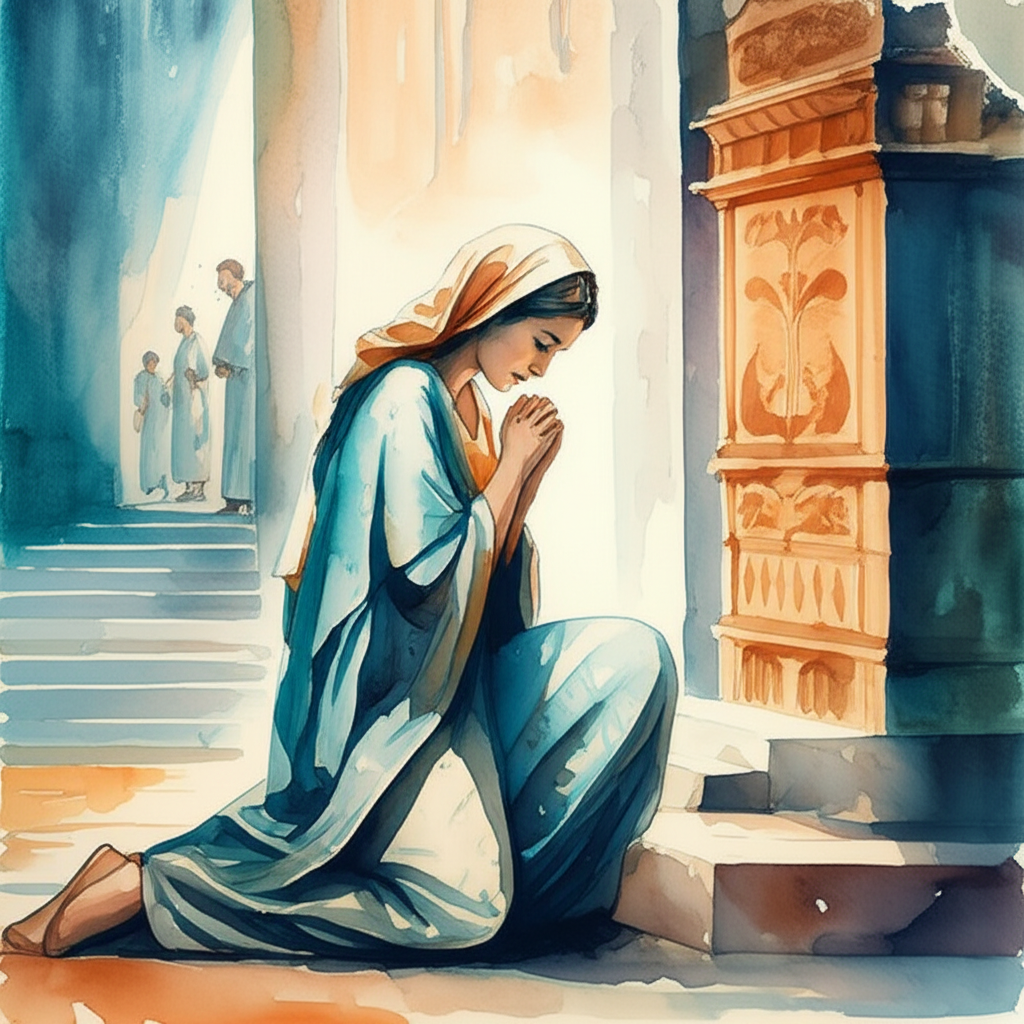
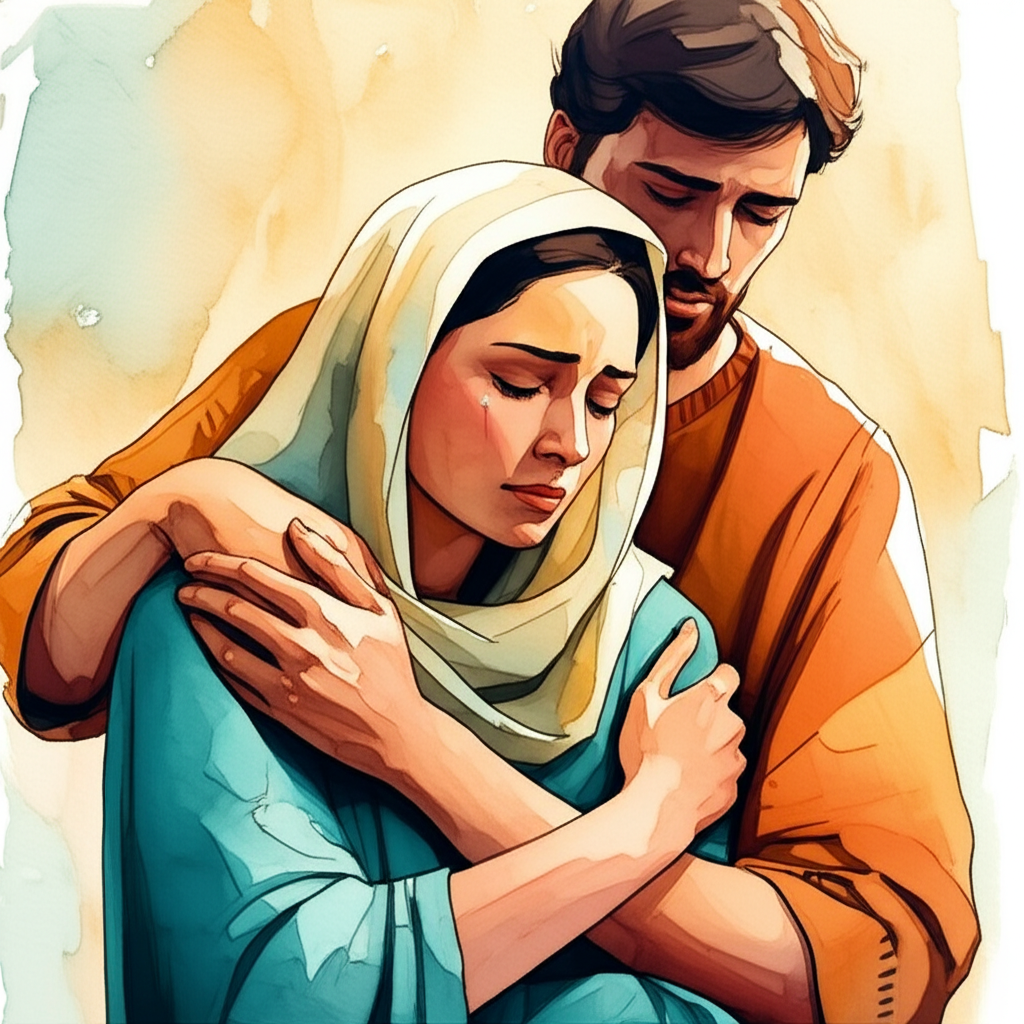
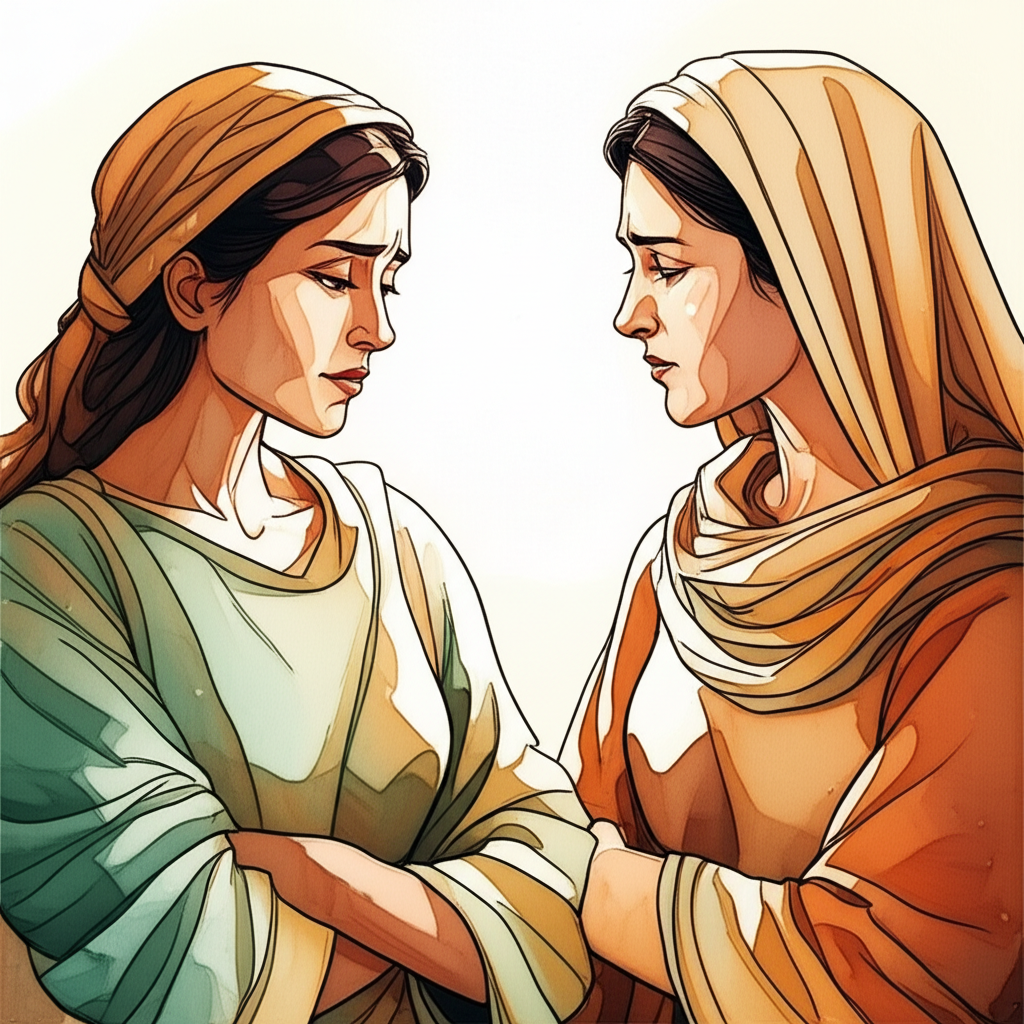
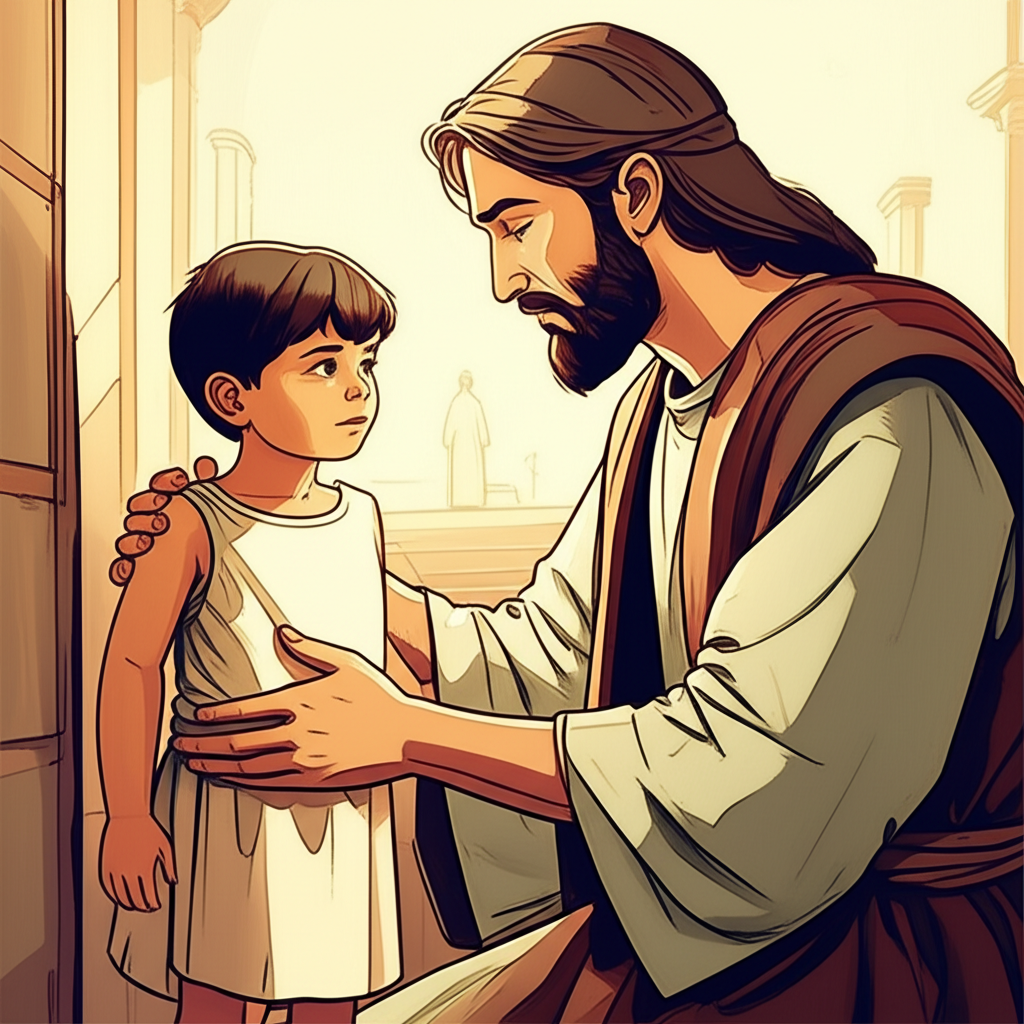
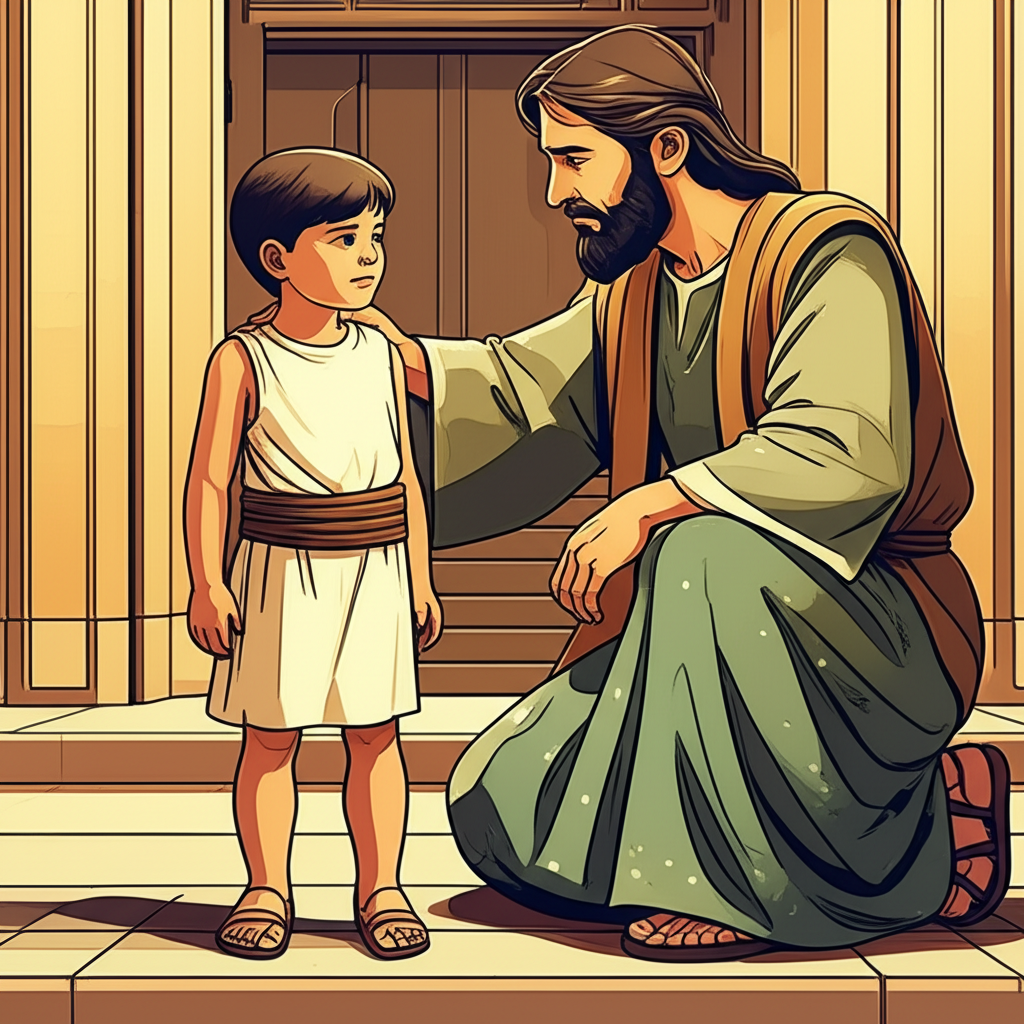
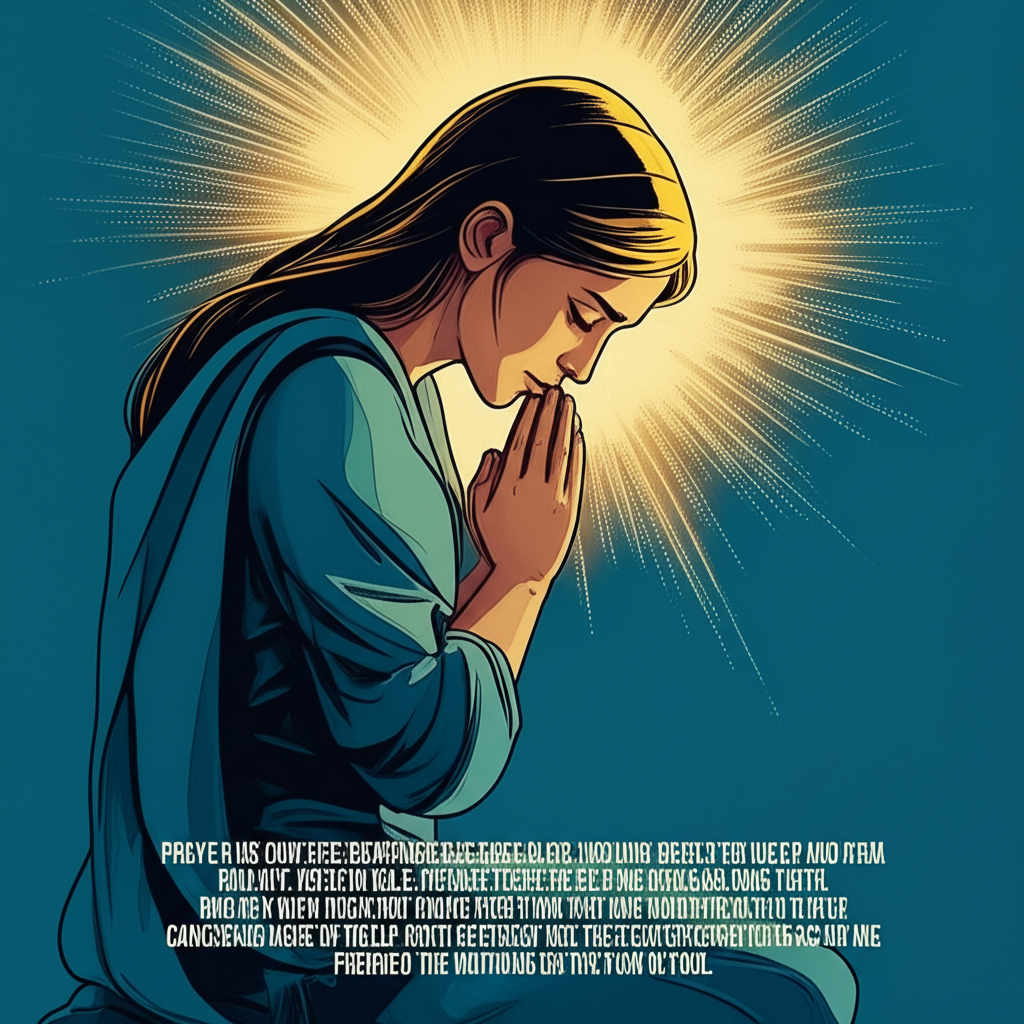
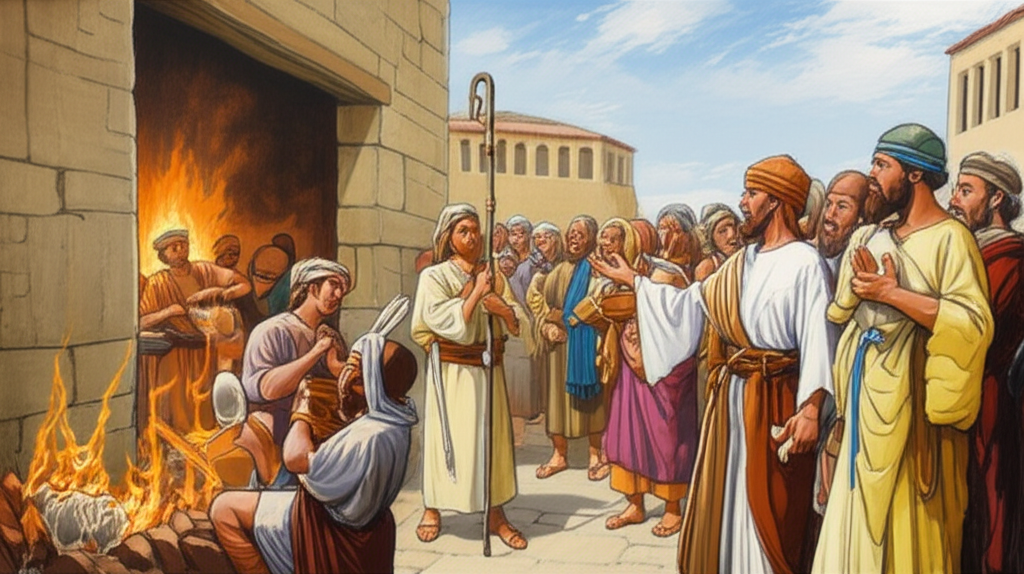
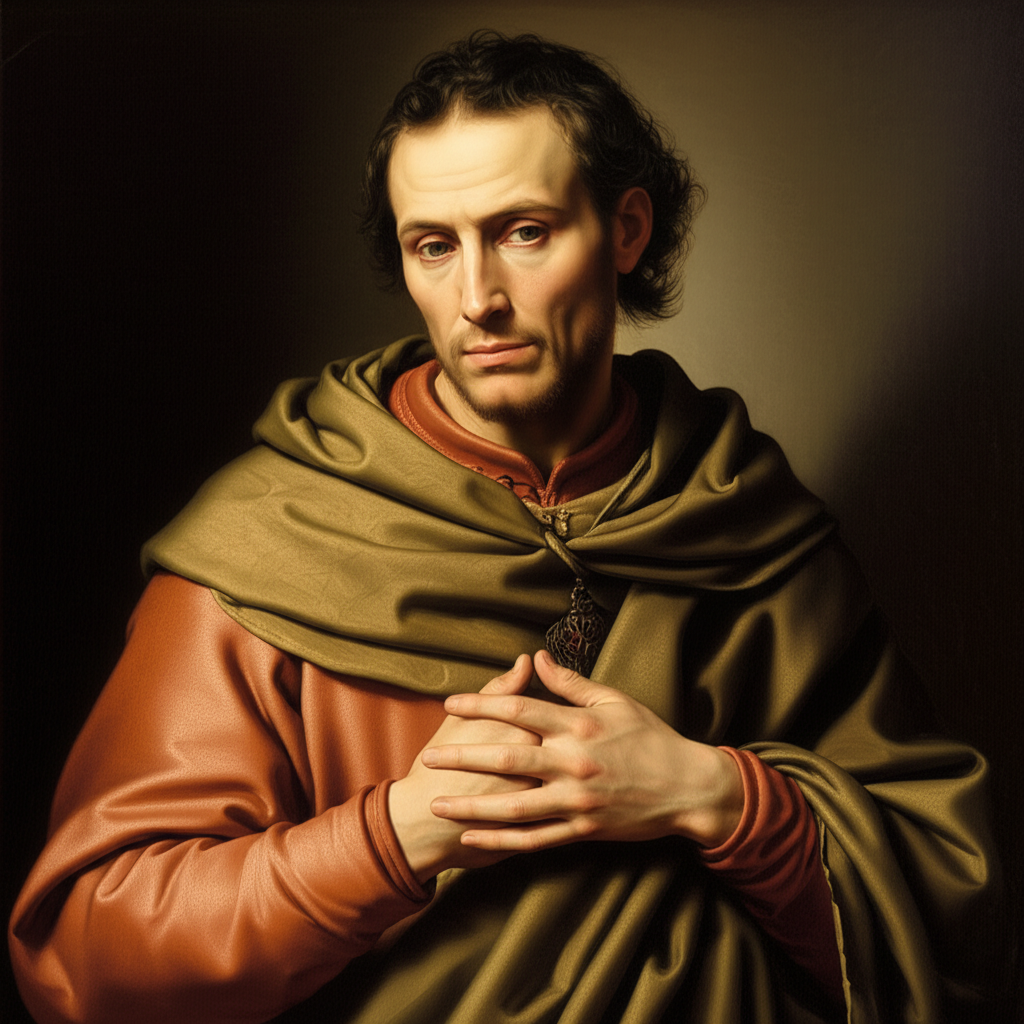
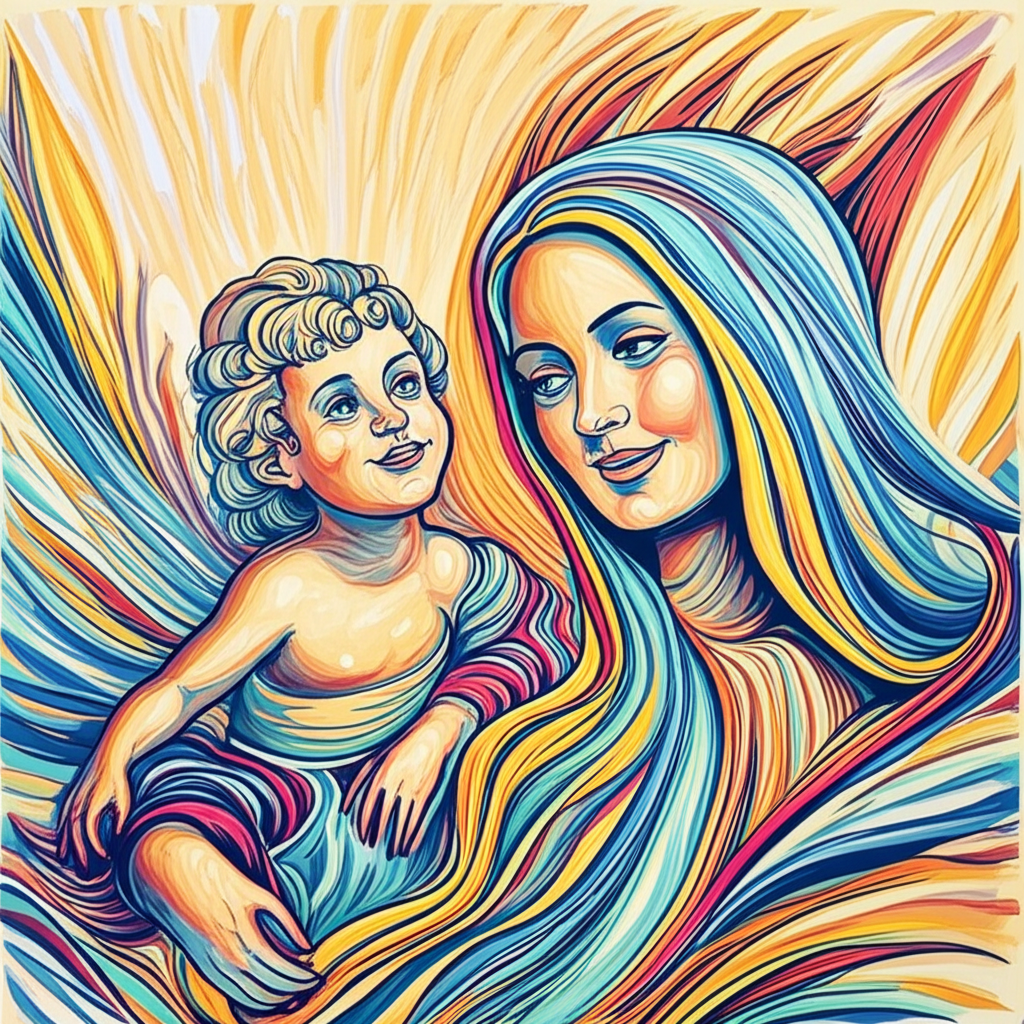
1 Samuel chapter 1 kjv
- 1 Now there was a certain man of Ramathaimzophim, of mount Ephraim, and his name was Elkanah, the son of Jeroham, the son of Elihu, the son of Tohu, the son of Zuph, an Ephrathite:
- 2 And he had two wives; the name of the one was Hannah, and the name of the other Peninnah: and Peninnah had children, but Hannah had no children.
- 3 And this man went up out of his city yearly to worship and to sacrifice unto the LORD of hosts in Shiloh. And the two sons of Eli, Hophni and Phinehas, the priests of the LORD, were there.
- 4 And when the time was that Elkanah offered, he gave to Peninnah his wife, and to all her sons and her daughters, portions:
- 5 But unto Hannah he gave a worthy portion; for he loved Hannah: but the LORD had shut up her womb.
- 6 And her adversary also provoked her sore, for to make her fret, because the LORD had shut up her womb.
- 7 And as he did so year by year, when she went up to the house of the LORD, so she provoked her; therefore she wept, and did not eat.
- 8 Then said Elkanah her husband to her, Hannah, why weepest thou? and why eatest thou not? and why is thy heart grieved? am not I better to thee than ten sons?
- 9 So Hannah rose up after they had eaten in Shiloh, and after they had drunk. Now Eli the priest sat upon a seat by a post of the temple of the LORD.
- 10 And she was in bitterness of soul, and prayed unto the LORD, and wept sore.
- 11 And she vowed a vow, and said, O LORD of hosts, if thou wilt indeed look on the affliction of thine handmaid, and remember me, and not forget thine handmaid, but wilt give unto thine handmaid a man child, then I will give him unto the LORD all the days of his life, and there shall no razor come upon his head.
- 12 And it came to pass, as she continued praying before the LORD, that Eli marked her mouth.
- 13 Now Hannah, she spake in her heart; only her lips moved, but her voice was not heard: therefore Eli thought she had been drunken.
- 14 And Eli said unto her, How long wilt thou be drunken? put away thy wine from thee.
- 15 And Hannah answered and said, No, my lord, I am a woman of a sorrowful spirit: I have drunk neither wine nor strong drink, but have poured out my soul before the LORD.
- 16 Count not thine handmaid for a daughter of Belial: for out of the abundance of my complaint and grief have I spoken hitherto.
- 17 Then Eli answered and said, Go in peace: and the God of Israel grant thee thy petition that thou hast asked of him.
- 18 And she said, Let thine handmaid find grace in thy sight. So the woman went her way, and did eat, and her countenance was no more sad.
- 19 And they rose up in the morning early, and worshipped before the LORD, and returned, and came to their house to Ramah: and Elkanah knew Hannah his wife; and the LORD remembered her.
- 20 Wherefore it came to pass, when the time was come about after Hannah had conceived, that she bare a son, and called his name Samuel, saying, Because I have asked him of the LORD.
- 21 And the man Elkanah, and all his house, went up to offer unto the LORD the yearly sacrifice, and his vow.
- 22 But Hannah went not up; for she said unto her husband, I will not go up until the child be weaned, and then I will bring him, that he may appear before the LORD, and there abide for ever.
- 23 And Elkanah her husband said unto her, Do what seemeth thee good; tarry until thou have weaned him; only the LORD establish his word. So the woman abode, and gave her son suck until she weaned him.
- 24 And when she had weaned him, she took him up with her, with three bullocks, and one ephah of flour, and a bottle of wine, and brought him unto the house of the LORD in Shiloh: and the child was young.
- 25 And they slew a bullock, and brought the child to Eli.
- 26 And she said, Oh my lord, as thy soul liveth, my lord, I am the woman that stood by thee here, praying unto the LORD.
- 27 For this child I prayed; and the LORD hath given me my petition which I asked of him:
- 28 Therefore also I have lent him to the LORD; as long as he liveth he shall be lent to the LORD. And he worshipped the LORD there.
1 Samuel chapter 1 nkjv
- 1 Now there was a certain man of Ramathaim Zophim, of the mountains of Ephraim, and his name was Elkanah the son of Jeroham, the son of Elihu, the son of Tohu, the son of Zuph, an Ephraimite.
- 2 And he had two wives: the name of one was Hannah, and the name of the other Peninnah. Peninnah had children, but Hannah had no children.
- 3 This man went up from his city yearly to worship and sacrifice to the LORD of hosts in Shiloh. Also the two sons of Eli, Hophni and Phinehas, the priests of the LORD, were there.
- 4 And whenever the time came for Elkanah to make an offering, he would give portions to Peninnah his wife and to all her sons and daughters.
- 5 But to Hannah he would give a double portion, for he loved Hannah, although the LORD had closed her womb.
- 6 And her rival also provoked her severely, to make her miserable, because the LORD had closed her womb.
- 7 So it was, year by year, when she went up to the house of the LORD, that she provoked her; therefore she wept and did not eat.
- 8 Then Elkanah her husband said to her, "Hannah, why do you weep? Why do you not eat? And why is your heart grieved? Am I not better to you than ten sons?"
- 9 So Hannah arose after they had finished eating and drinking in Shiloh. Now Eli the priest was sitting on the seat by the doorpost of the tabernacle of the LORD.
- 10 And she was in bitterness of soul, and prayed to the LORD and wept in anguish.
- 11 Then she made a vow and said, "O LORD of hosts, if You will indeed look on the affliction of Your maidservant and remember me, and not forget Your maidservant, but will give Your maidservant a male child, then I will give him to the LORD all the days of his life, and no razor shall come upon his head."
- 12 And it happened, as she continued praying before the LORD, that Eli watched her mouth.
- 13 Now Hannah spoke in her heart; only her lips moved, but her voice was not heard. Therefore Eli thought she was drunk.
- 14 So Eli said to her, "How long will you be drunk? Put your wine away from you!"
- 15 But Hannah answered and said, "No, my lord, I am a woman of sorrowful spirit. I have drunk neither wine nor intoxicating drink, but have poured out my soul before the LORD.
- 16 "Do not consider your maidservant a wicked woman, for out of the abundance of my complaint and grief I have spoken until now."
- 17 Then Eli answered and said, "Go in peace, and the God of Israel grant your petition which you have asked of Him."
- 18 And she said, "Let your maidservant find favor in your sight." So the woman went her way and ate, and her face was no longer sad.
- 19 Then they rose early in the morning and worshiped before the LORD, and returned and came to their house at Ramah. And Elkanah knew Hannah his wife, and the LORD remembered her.
- 20 So it came to pass in the process of time that Hannah conceived and bore a son, and called his name Samuel, saying, "Because I have asked for him from the LORD."
- 21 Now the man Elkanah and all his house went up to offer to the LORD the yearly sacrifice and his vow.
- 22 But Hannah did not go up, for she said to her husband, "Not until the child is weaned; then I will take him, that he may appear before the LORD and remain there forever."
- 23 So Elkanah her husband said to her, "Do what seems best to you; wait until you have weaned him. Only let the LORD establish His word." Then the woman stayed and nursed her son until she had weaned him.
- 24 Now when she had weaned him, she took him up with her, with three bulls, one ephah of flour, and a skin of wine, and brought him to the house of the LORD in Shiloh. And the child was young.
- 25 Then they slaughtered a bull, and brought the child to Eli.
- 26 And she said, "O my lord! As your soul lives, my lord, I am the woman who stood by you here, praying to the LORD.
- 27 For this child I prayed, and the LORD has granted me my petition which I asked of Him.
- 28 Therefore I also have lent him to the LORD; as long as he lives he shall be lent to the LORD." So they worshiped the LORD there.
1 Samuel chapter 1 niv
- 1 There was a certain man from Ramathaim, a Zuphite from the hill country of Ephraim, whose name was Elkanah son of Jeroham, the son of Elihu, the son of Tohu, the son of Zuph, an Ephraimite.
- 2 He had two wives; one was called Hannah and the other Peninnah. Peninnah had children, but Hannah had none.
- 3 Year after year this man went up from his town to worship and sacrifice to the LORD Almighty at Shiloh, where Hophni and Phinehas, the two sons of Eli, were priests of the LORD.
- 4 Whenever the day came for Elkanah to sacrifice, he would give portions of the meat to his wife Peninnah and to all her sons and daughters.
- 5 But to Hannah he gave a double portion because he loved her, and the LORD had closed her womb.
- 6 Because the LORD had closed Hannah's womb, her rival kept provoking her in order to irritate her.
- 7 This went on year after year. Whenever Hannah went up to the house of the LORD, her rival provoked her till she wept and would not eat.
- 8 Her husband Elkanah would say to her, "Hannah, why are you weeping? Why don't you eat? Why are you downhearted? Don't I mean more to you than ten sons?"
- 9 Once when they had finished eating and drinking in Shiloh, Hannah stood up. Now Eli the priest was sitting on his chair by the doorpost of the LORD's house.
- 10 In her deep anguish Hannah prayed to the LORD, weeping bitterly.
- 11 And she made a vow, saying, "LORD Almighty, if you will only look on your servant's misery and remember me, and not forget your servant but give her a son, then I will give him to the LORD for all the days of his life, and no razor will ever be used on his head."
- 12 As she kept on praying to the LORD, Eli observed her mouth.
- 13 Hannah was praying in her heart, and her lips were moving but her voice was not heard. Eli thought she was drunk
- 14 and said to her, "How long are you going to stay drunk? Put away your wine."
- 15 "Not so, my lord," Hannah replied, "I am a woman who is deeply troubled. I have not been drinking wine or beer; I was pouring out my soul to the LORD.
- 16 Do not take your servant for a wicked woman; I have been praying here out of my great anguish and grief."
- 17 Eli answered, "Go in peace, and may the God of Israel grant you what you have asked of him."
- 18 She said, "May your servant find favor in your eyes." Then she went her way and ate something, and her face was no longer downcast.
- 19 Early the next morning they arose and worshiped before the LORD and then went back to their home at Ramah. Elkanah made love to his wife Hannah, and the LORD remembered her.
- 20 So in the course of time Hannah became pregnant and gave birth to a son. She named him Samuel, saying, "Because I asked the LORD for him."
- 21 When her husband Elkanah went up with all his family to offer the annual sacrifice to the LORD and to fulfill his vow,
- 22 Hannah did not go. She said to her husband, "After the boy is weaned, I will take him and present him before the LORD, and he will live there always."
- 23 "Do what seems best to you," her husband Elkanah told her. "Stay here until you have weaned him; only may the LORD make good his word." So the woman stayed at home and nursed her son until she had weaned him.
- 24 After he was weaned, she took the boy with her, young as he was, along with a three-year-old bull, an ephah of flour and a skin of wine, and brought him to the house of the LORD at Shiloh.
- 25 When the bull had been sacrificed, they brought the boy to Eli,
- 26 and she said to him, "Pardon me, my lord. As surely as you live, I am the woman who stood here beside you praying to the LORD.
- 27 I prayed for this child, and the LORD has granted me what I asked of him.
- 28 So now I give him to the LORD. For his whole life he will be given over to the LORD." And he worshiped the LORD there.
1 Samuel chapter 1 esv
- 1 There was a certain man of Ramathaim-zophim of the hill country of Ephraim whose name was Elkanah the son of Jeroham, son of Elihu, son of Tohu, son of Zuph, an Ephrathite.
- 2 He had two wives. The name of the one was Hannah, and the name of the other, Peninnah. And Peninnah had children, but Hannah had no children.
- 3 Now this man used to go up year by year from his city to worship and to sacrifice to the LORD of hosts at Shiloh, where the two sons of Eli, Hophni and Phinehas, were priests of the LORD.
- 4 On the day when Elkanah sacrificed, he would give portions to Peninnah his wife and to all her sons and daughters.
- 5 But to Hannah he gave a double portion, because he loved her, though the LORD had closed her womb.
- 6 And her rival used to provoke her grievously to irritate her, because the LORD had closed her womb.
- 7 So it went on year by year. As often as she went up to the house of the LORD, she used to provoke her. Therefore Hannah wept and would not eat.
- 8 And Elkanah, her husband, said to her, "Hannah, why do you weep? And why do you not eat? And why is your heart sad? Am I not more to you than ten sons?"
- 9 After they had eaten and drunk in Shiloh, Hannah rose. Now Eli the priest was sitting on the seat beside the doorpost of the temple of the LORD.
- 10 She was deeply distressed and prayed to the LORD and wept bitterly.
- 11 And she vowed a vow and said, "O LORD of hosts, if you will indeed look on the affliction of your servant and remember me and not forget your servant, but will give to your servant a son, then I will give him to the LORD all the days of his life, and no razor shall touch his head."
- 12 As she continued praying before the LORD, Eli observed her mouth.
- 13 Hannah was speaking in her heart; only her lips moved, and her voice was not heard. Therefore Eli took her to be a drunken woman.
- 14 And Eli said to her, "How long will you go on being drunk? Put your wine away from you."
- 15 But Hannah answered, "No, my lord, I am a woman troubled in spirit. I have drunk neither wine nor strong drink, but I have been pouring out my soul before the LORD.
- 16 Do not regard your servant as a worthless woman, for all along I have been speaking out of my great anxiety and vexation."
- 17 Then Eli answered, "Go in peace, and the God of Israel grant your petition that you have made to him."
- 18 And she said, "Let your servant find favor in your eyes." Then the woman went her way and ate, and her face was no longer sad.
- 19 They rose early in the morning and worshiped before the LORD; then they went back to their house at Ramah. And Elkanah knew Hannah his wife, and the LORD remembered her.
- 20 And in due time Hannah conceived and bore a son, and she called his name Samuel, for she said, "I have asked for him from the LORD."
- 21 The man Elkanah and all his house went up to offer to the LORD the yearly sacrifice and to pay his vow.
- 22 But Hannah did not go up, for she said to her husband, "As soon as the child is weaned, I will bring him, so that he may appear in the presence of the LORD and dwell there forever."
- 23 Elkanah her husband said to her, "Do what seems best to you; wait until you have weaned him; only, may the LORD establish his word." So the woman remained and nursed her son until she weaned him.
- 24 And when she had weaned him, she took him up with her, along with a three-year-old bull, an ephah of flour, and a skin of wine, and she brought him to the house of the LORD at Shiloh. And the child was young.
- 25 Then they slaughtered the bull, and they brought the child to Eli.
- 26 And she said, "Oh, my lord! As you live, my lord, I am the woman who was standing here in your presence, praying to the LORD.
- 27 For this child I prayed, and the LORD has granted me my petition that I made to him.
- 28 Therefore I have lent him to the LORD. As long as he lives, he is lent to the LORD." And he worshiped the LORD there.
1 Samuel chapter 1 nlt
- 1 There was a man named Elkanah who lived in Ramah in the region of Zuph in the hill country of Ephraim. He was the son of Jeroham, son of Elihu, son of Tohu, son of Zuph, of Ephraim.
- 2 Elkanah had two wives, Hannah and Peninnah. Peninnah had children, but Hannah did not.
- 3 Each year Elkanah would travel to Shiloh to worship and sacrifice to the LORD of Heaven's Armies at the Tabernacle. The priests of the LORD at that time were the two sons of Eli ? Hophni and Phinehas.
- 4 On the days Elkanah presented his sacrifice, he would give portions of the meat to Peninnah and each of her children.
- 5 And though he loved Hannah, he would give her only one choice portion because the LORD had given her no children.
- 6 So Peninnah would taunt Hannah and make fun of her because the LORD had kept her from having children.
- 7 Year after year it was the same ? Peninnah would taunt Hannah as they went to the Tabernacle. Each time, Hannah would be reduced to tears and would not even eat.
- 8 "Why are you crying, Hannah?" Elkanah would ask. "Why aren't you eating? Why be downhearted just because you have no children? You have me ? isn't that better than having ten sons?"
- 9 Once after a sacrificial meal at Shiloh, Hannah got up and went to pray. Eli the priest was sitting at his customary place beside the entrance of the Tabernacle.
- 10 Hannah was in deep anguish, crying bitterly as she prayed to the LORD.
- 11 And she made this vow: "O LORD of Heaven's Armies, if you will look upon my sorrow and answer my prayer and give me a son, then I will give him back to you. He will be yours for his entire lifetime, and as a sign that he has been dedicated to the LORD, his hair will never be cut. "
- 12 As she was praying to the LORD, Eli watched her.
- 13 Seeing her lips moving but hearing no sound, he thought she had been drinking.
- 14 "Must you come here drunk?" he demanded. "Throw away your wine!"
- 15 "Oh no, sir!" she replied. "I haven't been drinking wine or anything stronger. But I am very discouraged, and I was pouring out my heart to the LORD.
- 16 Don't think I am a wicked woman! For I have been praying out of great anguish and sorrow."
- 17 "In that case," Eli said, "go in peace! May the God of Israel grant the request you have asked of him."
- 18 "Oh, thank you, sir!" she exclaimed. Then she went back and began to eat again, and she was no longer sad.
- 19 The entire family got up early the next morning and went to worship the LORD once more. Then they returned home to Ramah. When Elkanah slept with Hannah, the LORD remembered her plea,
- 20 and in due time she gave birth to a son. She named him Samuel, for she said, "I asked the LORD for him."
- 21 The next year Elkanah and his family went on their annual trip to offer a sacrifice to the LORD and to keep his vow.
- 22 But Hannah did not go. She told her husband, "Wait until the boy is weaned. Then I will take him to the Tabernacle and leave him there with the LORD permanently. "
- 23 "Whatever you think is best," Elkanah agreed. "Stay here for now, and may the LORD help you keep your promise. " So she stayed home and nursed the boy until he was weaned.
- 24 When the child was weaned, Hannah took him to the Tabernacle in Shiloh. They brought along a three-year-old bull for the sacrifice and a basket of flour and some wine.
- 25 After sacrificing the bull, they brought the boy to Eli.
- 26 "Sir, do you remember me?" Hannah asked. "I am the very woman who stood here several years ago praying to the LORD.
- 27 I asked the LORD to give me this boy, and he has granted my request.
- 28 Now I am giving him to the LORD, and he will belong to the LORD his whole life." And they worshiped the LORD there.
- Bible Book of 1 Samuel
- 1 Story of Hannah
- 2 Hannah's song and Prayer
- 3 Story of Samuel
- 4 The Philistines Capture the Ark
- 5 The Philistines and the Ark
- 6 The Ark Returned to Israel
- 7 Samuel Judges Israel
- 8 Israel Asks for a King
- 9 Saul the first king of Israel
- 10 Samuel Anoints Saul as King
- 11 Saul Defeats the Ammonites
- 12 Samuel's Farewell Address
- 13 Saul Fights the Philistines
- 14 Story of Jonathan
- 15 Saul and the Amalekites
- 16 David annointed
- 17 David and Goliath story
- 18 David and Jonathan's Friendship
- 19 Saul Tries to Kill David
- 20 Jonathan Warns David
- 21 David and the Holy Bread
- 22 David in the cav of Adullam
- 23 David Saves the City of Keilah
- 24 David Spares Saul's Life
- 25 Death of Samuel and Abigail
- 26 David Spares Saul Again
- 27 David Flees to the Philistines
- 28 Saul consults the Witch of Endor
- 29 The Philistines Reject David
- 30 David's Wives Are Captured
- 31 Death of Saul